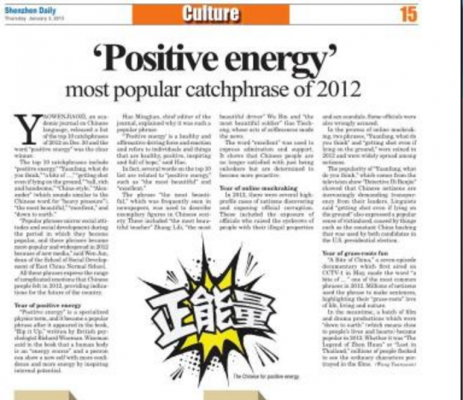Few non-Chinese can claim the odd distinction of having forged a favoured political catchphrase of the Chinese Communist Party. But British psychologist Richard Wiseman may have done just that, thanks to the 2012 publication of his self-help book Rip It Up, rendered in Chinese translation as Positive Energy.
“Positive energy,” or zhengnengliang (正能量), is now at the very heart of political discourse in the Xi Jinping era, having direct implications for media and Internet control, and extending to international diplomacy and other areas as well.
Delivering the keynote speech to the Fifth China-UK Internet Roundtable in September 2013, China’s cyber-security czar, Lu Wei, doffed his hat to Richard Wiseman as he noted that “positive energy” had topped the list of popular new catchphrases for the year. “The phrase ‘positive energy,’” said Lu Wei, “has acquired extra levels of meaning in China today.”
Indeed it has.

And Lu Wei, the director of the powerful Cyberspace Administration of China (CAC) — under the Xi Jinping led Central Leading Group for Cyberspace Affairs — has played a critical role in conferring these “extra levels” of meaning.
The first public use of positive energy as part of the Communist Party’s mainstream political discourse came one year ahead of Lu Wei’s roundtable address in London, when he served as minister of propaganda for the city of Beijing. At a discussion forum on September 3, 2012, called “There is a Spirit Called the Beijing Spirit,” Wang Danyan (王丹彦), deputy section head of the Propaganda Management
Division of what was then still SARFT (now merged with the General Administration of Press and Publications), voiced her approval of a TV drama called Beijing Youth (北京青年), saying dramas of its kind “transmit positive energy to society.” The need to spread positive energy as a matter of propaganda policy was a central theme of that forum, where Lu Wei, who would soon rise to a new and powerful post as head of the CAC, was the most senior official present.
Lu Wei’s London speech a year later was called “Liberty and Order In Cyberspace.” Quoting from World Wide Web founder Tim Berners-Lee (“This is for everyone”) and from George Bernard Shaw (who once said “the first condition of progress is the removal of censorship”), Lu cut straight from the privilege of liberty to the imperative of order:
The famous writer George Bernard Shaw once said: “Liberty means responsibility.” I think I can also say “Liberty means order.” The two are closely linked, as liberty is the aim of order and order is the safeguard of liberty. Liberty cannot exist without order. Where there is no order, there is no liberty. The more we seek liberty, the more we need order. The essence of order is exactly that it is “for everyone.”
When he says “order,” Lu Wei of course means control. And control is to be achieved through a campaign of “positive energy.”
The devilish genius of “positive energy” is the way it seems more spiritual than ideological, as though it isn’t about exercising control over the minds of the population so much as engaging in a national project of self-help. Translated overseas, the phrase becomes almost touchy-feely, a saccharine expression of everyone’s fondest hopes. Here is Lu Wei in London once again:
“Positive energy is meant to give people confidence and hope, encourage people to love their country, society and life, as well as to pursue nice things. Everything we do is ultimately for the sake of spreading positive energy. Positive energy knows no boundaries. If everyone were to spread positive energy on the Internet, the world would be a much better place.
Tomorrow, China will host its second World Internet Conference (WIC), actively promoting its vision of cyber-sovereignty as it dangles the fat carrot of its domestic Internet market before global tech firms. Lu Wei and Xi Jinping will no doubt speak again about the imperative of order and freedom, of the restraints needed to save us from ourselves.
“Freedom is our goal; order is our means,” Lu Wei said at his pre-WIC press conference last week.
Behind the feel-good vibe, of course, this is all about control. And “positive energy” is core to the strategy of control. The following passage from a recent article in Guangming Daily, published by the Central Propaganda Department, allows us to see just how ideological this concept actually is, marking the intensity of Xi Jinping’s struggle against all dissident voices on the Internet:
[We must] focus on our grasp of the “online army” programme. This means that with the demand of “consolidating and expanding the [pro-Party] red zone (红色地带), transforming the [unaligned] grey band into red band territory, and courageously engaging in struggle within the black band (黑色地带)” , [we must] build a powerful “online army” that we can utilise, winning the online battle for public opinion . . .
The characterisation of unwelcome viewpoints in the online sphere as “the black band” is chillingly reminiscent of ideological struggles in the Chinese Communist Party’s past.
How will the Party win this “battle for public opinion”? Among other tactics, such as the expansion of “online news commentary groups’ (网评专家组), achieving these goals, says the Guangming Daily, would necessitate “developing and strengthening teams of [pro-Party] Internet commentators (网评员) online . . . and creating a new matrix of “online armies” (网军) that could concentrate positive energy online.”
As we’ve been saying for some time now, “positive energy” is a Party catchphrase to watch — not only for its mobilisation in the arena of press and Internet control, but also for the way it strikes a different tone among CCP terminologies.
For more on this catchphrase we direct you to a recent piece by former China Media Project fellow Zhang Ming (张鸣), a professor at Renmin University of China. In tracing the origins of the super-popularity of “positive energy,” Zhang goes back to the 2012 film Beijing Blues, which is possibly indebted to Wiseman’s book.




















